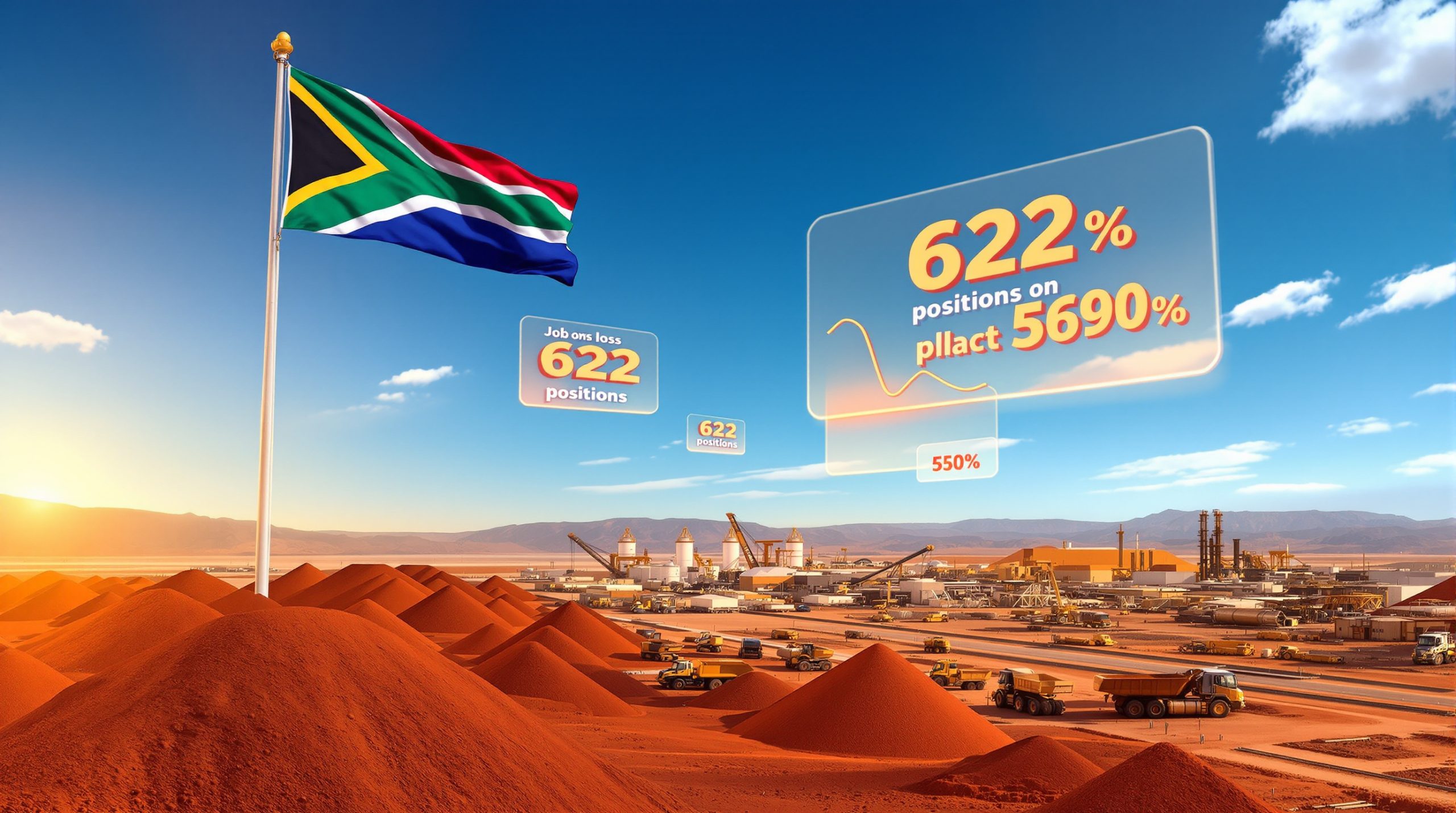What Are the MRIWA PhD Scholarship Programs and Their Impact on Mining Innovation?
The Minerals Research Institute of Western Australia (MRIWA) PhD Scholarship Programs represent a strategic investment in Western Australia's mining future. Awarded annually to WA-based researchers, these prestigious scholarships support innovative projects addressing critical challenges in the minerals sector. The program's fundamental goal is to build intellectual capacity and develop practical solutions that strengthen Western Australia's position as a global mining innovation trends leader.
The scholarships provide both financial support and invaluable industry connections for PhD candidates tackling complex industry problems. By strategically funding research in priority areas such as resource discovery, emissions reduction, and waste management, MRIWA creates a pipeline of innovation that directly benefits the state's mining sector.
According to recent data from the Australian Mining Review, scholarship recipients consistently produce research that translates into implementable technologies, with approximately 65% of projects leading to field trials within mining operations across Western Australia.
"These scholarships represent more than academic pursuit—they're about creating a sustainable future for Western Australia's mining industry through targeted innovation and developing specialized expertise," notes the MRIWA Research Committee.
Who Are the 2025 MRIWA PhD Scholarship Winners?
The 2025 MRIWA scholarship recipients exemplify the program's commitment to addressing diverse challenges facing the mining industry. Each researcher brings unique expertise to critical areas requiring innovative solutions.
The Three Groundbreaking Researchers
Three exceptional PhD candidates have been recognized in the 2025 MRIWA PhD scholarship winners program, each pursuing research with significant potential to transform mining practices:
- Kenneth Akiti – Recipient of the Odwyn Jones PhD Scholarship
- Yasamin Hamidian – Recipient of the MRIWA PhD Scholarship for Women
- Farid Ullah – Recipient of the MRIWA PhD Scholarship
The selection process evaluated candidates based on research quality, industry relevance, and alignment with MRIWA's strategic priorities. These three researchers stood out for their innovative approaches to solving critical industry challenges.
Kenneth Akiti's Research Focus
Kenneth Akiti's groundbreaking work addresses an increasingly urgent challenge in mining operations: the sustainable management of retired mining vehicle batteries. As mining operations transition toward electrification, the sector faces growing volumes of end-of-life battery components that require specialized handling.
Akiti's research provides:
- A comprehensive blueprint for sustainable battery management that addresses both regulatory requirements and environmental considerations
- Economic viability assessment tools for recycling versus repurposing decisions
- Methodologies for extracting and recovering critical minerals from spent batteries
- Practical frameworks that mining companies can implement across different operational scales
His work is particularly timely as Western Australia's mining fleets increasingly transition to electric vehicles, creating an impending wave of battery recycling breakthrough challenges that require proactive solutions.
Yasamin Hamidian's Innovative Extraction Technology
As the recipient of the MRIWA PhD Scholarship for Women, Hamidian is developing revolutionary technology for lithium recovery from mining waste—a critical capability as global demand for battery minerals continues to surge.
Her research focuses on:
- Engineering a specialized gas-assisted ion-selective membrane specifically designed for lithium extraction
- Creating processing technologies that can transform mining tailings from cost centers to revenue sources
- Developing methods that significantly reduce the environmental footprint of lithium production
- Designing scalable systems that can be deployed at existing mining operations
Hamidian's work holds particular promise for Western Australia's lithium sector, which has seen production expand by over 20% annually in recent years. By enabling the recovery of lithium from previously discarded materials, her research could substantially extend the economic value of existing mining operations through advanced lithium extraction techniques.
Farid Ullah's Exploration Enhancement Research
Ullah's research targets one of mining's fundamental challenges: improving the accuracy and efficiency of mineral discovery. As near-surface deposits become increasingly scarce, the industry requires more sophisticated approaches to identify viable resources.
His work focuses on:
- Enhancing electromagnetic data integration techniques through advanced signal processing
- Developing AI-assisted algorithms that can identify subtle signatures of mineral deposits
- Creating visualization tools that help exploration teams interpret complex geophysical data
- Building methodologies that reduce the need for expensive exploratory drilling
Industry experts note that Ullah's research could potentially increase discovery success rates by 15-20%, representing significant efficiency improvements in exploration programs across Western Australia's diverse mineral provinces. His innovative approaches to drill results interpretation could transform how companies identify and evaluate potential resources.
How Does MRIWA's Research Priority Plan Guide Scholarship Selection?
Alignment with Industry Needs
MRIWA's scholarship program operates within a strategic framework designed to address the most pressing challenges facing Western Australia's minerals industry. The Research Priority Plan serves as the guiding document, identifying key areas where innovation can deliver maximum impact.
The current priority areas include:
- Resource Discovery and Extraction: Improving exploration success rates and reducing discovery costs
- Environmental Performance: Minimizing mining's ecological footprint through emissions reduction and water conservation
- Operational Efficiency: Developing technologies that reduce energy consumption and increase productivity
- Waste Transformation: Creating value from tailings and other mining by-products
- Future Workforce: Building technological and human capabilities for next-generation mining
This framework ensures that scholarship funding is directed toward research that addresses real-world industry challenges rather than purely academic interests.
Selection Criteria for Scholarship Recipients
The MRIWA scholarship selection process employs a rigorous multi-stage evaluation designed to identify candidates whose work offers the greatest potential benefit to Western Australia's mining sector.
Candidates are evaluated based on:
- Industry Relevance: The potential for research to address significant challenges facing Western Australia's minerals sector
- Innovation Potential: The degree to which the proposed research represents novel approaches or technologies
- Implementation Pathway: The feasibility of translating research outcomes into practical applications
- Academic Excellence: The candidate's demonstrated capability to conduct high-quality research
- Strategic Alignment: The relationship between the proposed research and MRIWA's priority areas
This comprehensive assessment ensures that scholarship recipients not only demonstrate academic excellence but also possess the vision to create solutions with tangible industry benefits.
What Additional Educational Programs Does MRIWA Support?
The Co-operative Education for Enterprise Development Program
Beyond the PhD scholarships, MRIWA has expanded its educational portfolio to include the Co-operative Education for Enterprise Development program, a specialized initiative designed to create additional pathways for talented students to contribute to mining innovation.
Key aspects of this program include:
- Industry Integration: Four new students recently joined this program delivered through the University of Western Australia
- Practical Experience: Participants alternate between academic studies and paid work placements with industry partners
- Specialized Curriculum: Coursework designed in collaboration with mining industry stakeholders
- Mentorship Opportunities: Direct guidance from experienced industry professionals
This program represents MRIWA's commitment to developing talent across multiple educational levels, creating a comprehensive pipeline of expertise to support Western Australia's mining future.
"The Co-operative Education program complements our PhD scholarships by building practical industry skills alongside academic knowledge—exactly what the sector needs," explains a senior MRIWA representative.
Why Are These Scholarship Programs Important for Western Australia?
Economic and Environmental Benefits
According to WA Mines and Petroleum Minister David Michael, these programs deliver substantial benefits to the state across multiple dimensions:
"These programs develop the next generation of talent driving innovation across the resources sector," Michael stated. "The research outcomes contribute directly to a more sustainable minerals industry and help deliver cutting-edge solutions for the challenges of tomorrow."
The economic significance cannot be overstated. Western Australia's mining industry:
- Contributes over $100 billion annually to the state's economy
- Employs more than 140,000 people across the state
- Accounts for approximately 36% of Western Australia's gross state product
- Represents Australia's largest export sector
By fostering innovation in this critical industry, the scholarship programs help maintain Western Australia's competitive advantage in global minerals markets while addressing growing sustainability challenges.
Long-term Industry Impact
The scholarship programs create a pipeline of expertise that delivers benefits extending far beyond individual research projects:
- Knowledge Retention: Develops specialized expertise that remains within Western Australia
- Technology Commercialization: Creates intellectual property with potential global applications
- Sustainability Leadership: Positions Western Australia as a leader in responsible mining practices
- Industry Transformation: Supports the transition to more sustainable, efficient mining operations
- Talent Attraction: Enhances Western Australia's reputation as a center for mining innovation
This long-term capacity building helps ensure that Western Australia maintains its competitive advantage in the global minerals sector while transitioning toward more sustainable practices.
How Do These Innovations Address Current Mining Industry Challenges?
Sustainability Solutions
The 2025 MRIWA PhD scholarship winners' research directly addresses several pressing industry challenges that align with global sustainability imperatives:
- Battery Waste Management: Akiti's work provides solutions for the growing challenge of retired mining vehicle batteries, which contain both valuable materials and potentially hazardous components
- Resource Recovery: Hamidian's research explores extracting valuable lithium from what would otherwise be waste material, supporting circular economy principles
- Exploration Efficiency: Ullah's work aims to improve discovery rates, potentially reducing the environmental footprint of exploration activities by minimizing unnecessary drilling and site disturbance
These sustainability-focused innovations come at a critical time as mining companies face increasing pressure to reduce environmental impacts while maintaining operational viability.
Technological Advancement
Each research project represents technological innovation with practical applications that could transform mining operations:
- Specialized Membranes: Hamidian's gas-assisted ion-selective membranes represent a step-change in extraction technology, potentially replacing more resource-intensive conventional methods
- Advanced Data Integration: Ullah's electromagnetic data processing techniques leverage cutting-edge algorithms to extract more value from existing exploration data
- Lifecycle Management Systems: Akiti's battery management protocols integrate multiple technologies to create comprehensive waste management solutions
These technological advancements demonstrate how targeted research can address specific industry challenges through innovative approaches that combine scientific rigor with practical implementation pathways.
"What makes these projects particularly valuable is their focus on technologies that can be implemented at scale across Western Australia's diverse mining operations," notes a senior industry observer.
FAQ: MRIWA PhD Scholarships
How often are MRIWA PhD scholarships awarded?
The scholarships are awarded annually to Western Australia-based PhD candidates conducting research relevant to the state's minerals industry. Application cycles typically open in the third quarter each year, with recipients announced in the following calendar year.
What types of scholarships does MRIWA offer?
MRIWA offers several scholarship categories to support diverse research needs:
- Odwyn Jones PhD Scholarship: Named after a pioneering figure in Western Australian mining research
- MRIWA PhD Scholarship for Women: Specifically designed to increase female representation in mining research and address women in mining challenges
- General MRIWA PhD Scholarship: Open to all qualified candidates with relevant research proposals
Each category maintains the same rigorous selection standards while addressing specific strategic objectives within the research ecosystem.
What financial support do recipients receive?
Recipients receive both financial assistance and academic support throughout their research journey. While specific funding amounts vary by scholarship category, all provide:
- Annual stipend to cover living expenses
- Research expense allowances for equipment and materials
- Conference travel support to present findings
- Industry networking opportunities
This comprehensive support allows recipients to focus fully on their research without financial constraints limiting their progress.
How can prospective PhD students apply for these scholarships?
Interested candidates should:
- Review MRIWA's research priority plan to ensure alignment
- Develop a research proposal addressing specific industry challenges
- Secure support from an eligible Western Australian university
- Submit a complete application package through MRIWA's online portal
- Participate in interview processes if shortlisted
Successful applications typically demonstrate both academic excellence and a clear vision for how the research will benefit Western Australia's minerals industry.
What happens after students complete their MRIWA-funded research?
Many graduates go on to careers in the mining industry, research institutions, or government agencies where they can apply their specialized knowledge to real-world challenges. MRIWA maintains an active alumni network that continues to contribute to Western Australia's mining innovation ecosystem long after their initial research concludes.
Some notable outcomes from previous scholarship recipients include:
- Commercialized technologies now used across multiple mining operations
- Start-up companies developing specialized solutions for industry challenges
- Leadership positions within major mining companies and research organizations
- Ongoing collaboration with MRIWA on future research initiatives
This continuing engagement creates a virtuous cycle of innovation that strengthens with each new cohort of scholarship recipients.
Ready to Spot the Next Major Mineral Discovery?
Discover how the proprietary Discovery IQ model from Discovery Alert helps traders and investors identify significant ASX mineral discoveries before the broader market reacts. Visit the Discovery Alert discoveries page to understand how early identification of breakthrough announcements can lead to substantial investment returns.




